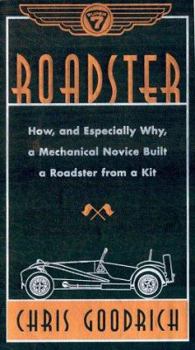Roadster: How, and Especially Why, a Mechanical Novice Built a Car from a Kit
What does a man do on reaching midlife? Stereo-typically, he buys a red sports car. But that was too pat for Chris Goodrich; he decided to build one instead, hoping to understand a culture generally considered unsuitable for a prep-school, Ivy League graduate. A self-confessed "auto-idiot," he was soon in over his head--but that proved part of the fun, because this immersion in auto mechanics forced Goodrich to can-front new ideas, new people, and new perspectives. In fourteen months it took to build the roadster he learned to appreciate not only how cars work but also the role they have played in shaping American culture--in the evolution of mass production and the reduction of craftsmen to wage slaves, in making the nation almost totally dependent on a machine that seemed to promise freedom.
Ultimately, Roadster is a celebration of the automobile, for Goodrich builds a Caterharn Seven. A 1957 Lotus design, it's everything a sports car should be and more-noisy, drafty, uncomfortable, and absolutely thrilling. In completing the Seven, and finally driving it, Goodrich finds a completion of his own--a personal connection between theory and practice, the mental and the manual.
"As antidote to a virulent case of modern anomie, Chris Goodrich decided to build himself a car. The example he chose was a Lotus Seven--perhaps the most charming retro vehicle in history--and he succeeded not only in assembling a worthy roadster but in tossing off along the way a lighthearted look at the history of industrial ideas. I envied him the process of building it almost as much as the car--or the book--he ended up with."
--John Jerome, author of Truck: On Rebuilding a Worn-Out Pickup, and Other Post-Technological Adventures When I told my friends I had decided, in my middle thirties, to build by hand a street-legal roadster, many suggested I was too young to be going through a midlife crisis. As time went on, I realized that the comment, intended humorously, held more than a grain of truth. It captured something I was loath to admit: that my working life was much less than I wanted it to be. I had held responsible positions, earned the respect of my peers, made a name for myself in (minor) professional circles ... and yet something was missing.
That something? Joy. Of discovery, of open doors, of seeing the world in new ways; of living in the moment; of following your bliss, as mythologist Joseph Campbell put it. Surely you could do the work you loved without succumbing to its incidental baggage? Pursue a career without kowtowing to careerism; grow professionally without being professionalized? I would come across, years later, the perfect diagnosis of my work malaise. "In the beginner's mind there are many possibilities," the Zen master Shunryu Suzuki told his students, "but in the expert's there are few."
--From Roadster






